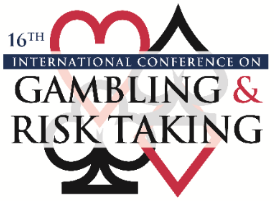Session Title
Session 3-3-C: Problem Gambling Treatment Issues
Presentation Type
Event
Location
The Mirage Hotel & Casino, Las Vegas, Nevada
Start Date
9-6-2016 2:00 PM
End Date
9-6-2016 3:30 PM
Disciplines
Clinical Psychology
Abstract
Treatments should be tailored to the individual in order to improve their effectiveness and efficiency. An assessment of treatment gains is essential to this goal, particularly the ability to identify when clinically significant change is achieved. This paper will examine the sensitivity and specificity of two constructs that moderate change for gambling-focused treatments: self-efficacy to control gambling and strength of gambling-related cognitive distortions.
Participants completed measures of gambling symptoms: the Gambling Self-Efficacy Questionnaire (GSEQ) to assess self-efficacy to control gambling, and the Gamblers’ Beliefs Questionnaire to assess cognitive distortions (GBQ). Included was a clinical sample of 312 treatment-seeking outpatient disordered gamblers. We conducted sensitivity/specificity analyses with the clinical sample and a community sample. For the GSEQ analyses, the community sample included 309 adults. For the GBQ analyses, we recruited 204 past-year gamblers from Mechanical Turk.
The clinical sample’s pre-treatment GSEQ scores (M = 42.3) were significantly lower than post-treatment scores (M = 77.9, t(210) = -10.8, p M = 71.2) were significantly higher than post-treatment scores (M = 46.7, t(126) = 6.5, p < .05) indicating a decrease in cognitive distortions. ROC analyses indicated that a score of 70 on the GSEQ provided high sensitivity (89%) and specificity (81%) with gambling disorder diagnosis. We found a linear relationship between gambling disorder and GBQ score.
These results can be used to guide clinical decisions about the inclusion of treatment elements and the conclusion of therapy.
Keywords
gambling, pathological gambling, treatment, assessment
Indicators of Clinically Significant Gambling Treatment Gains
The Mirage Hotel & Casino, Las Vegas, Nevada
Treatments should be tailored to the individual in order to improve their effectiveness and efficiency. An assessment of treatment gains is essential to this goal, particularly the ability to identify when clinically significant change is achieved. This paper will examine the sensitivity and specificity of two constructs that moderate change for gambling-focused treatments: self-efficacy to control gambling and strength of gambling-related cognitive distortions.
Participants completed measures of gambling symptoms: the Gambling Self-Efficacy Questionnaire (GSEQ) to assess self-efficacy to control gambling, and the Gamblers’ Beliefs Questionnaire to assess cognitive distortions (GBQ). Included was a clinical sample of 312 treatment-seeking outpatient disordered gamblers. We conducted sensitivity/specificity analyses with the clinical sample and a community sample. For the GSEQ analyses, the community sample included 309 adults. For the GBQ analyses, we recruited 204 past-year gamblers from Mechanical Turk.
The clinical sample’s pre-treatment GSEQ scores (M = 42.3) were significantly lower than post-treatment scores (M = 77.9, t(210) = -10.8, p M = 71.2) were significantly higher than post-treatment scores (M = 46.7, t(126) = 6.5, p < .05) indicating a decrease in cognitive distortions. ROC analyses indicated that a score of 70 on the GSEQ provided high sensitivity (89%) and specificity (81%) with gambling disorder diagnosis. We found a linear relationship between gambling disorder and GBQ score.
These results can be used to guide clinical decisions about the inclusion of treatment elements and the conclusion of therapy.


Comments
Attachment: PDF containing 18 slides